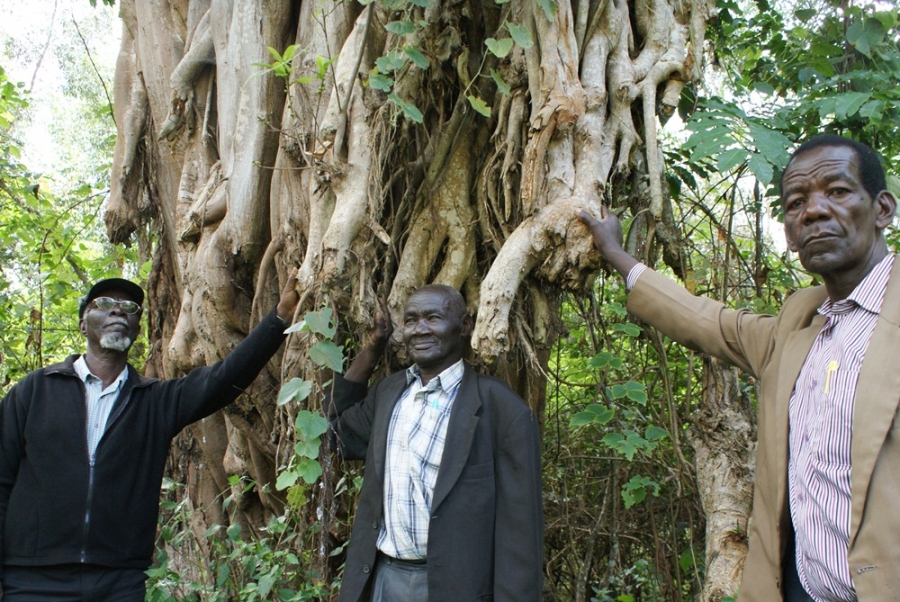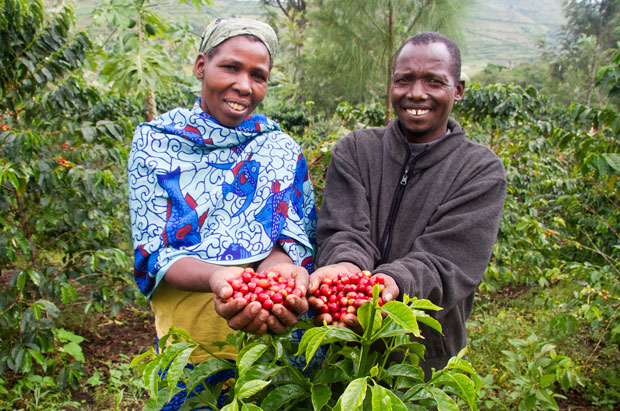
Cosmas Murunga, an elder from Kenya’s forest-dwelling Ogiek community, pointed at a beehive in a tree a few metres from his grass-thatched house on the mist-swathed slopes of Mount Elgon.
He said a government scheme allowing farmers to grow crops among seedlings has ruined his honey harvest in the Ogiek’s ancestral home, Chepkitale forest, in western Kenya.
“They used to be many, but pesticides from the farms have killed the bees,” the dreadlocked 70-year-old, wearing a faded brown flat cap, told the Thomson Reuters Foundation.
“We want PELIS system to be disbanded completely.”
The Plantation Establishment for Livelihood Improvement Scheme (PELIS), introduced by a 2005 law, aims to reduce illegal logging by giving poor people living near protected forests alternative ways of earning cash and putting food on the table.
But Murunga and other critics say land allocation for PELIS has been marred by corruption, with parcels intended for local communities going to outsiders who destroy indigenous trees.
The campaign of the 80,000-strong Ogiek and others, like the Sengwer in western Kenya, for stronger land rights illustrates a global conflict between indigenous peoples and conservation policies that exclude them from protected forests.
FIRED
Tensions are rife between Kenya’s government, forest guards, traditional communities evicted from their lands and others who profit, legally or illegally, from it.
Kenya has been hard hit by unlawful settlement, logging and charcoal production in its indigenous forests, reducing forest cover to seven percent of land mass, according to data from Kenya Forest Service (KFS), a state agency that manages forests.
Following his March appointment, environment minister Keriako Tobiko, issued a directive suspending the PELIS scheme in four forests near the capital Nairobi and set up a taskforce to review Kenya’s forest policies and laws within 90 days.
The former state prosecutor also fired top KFS officials and suspended and reshuffled others, saying that corruption in the agency was contributing to deforestation and conflicts with communities living around forests. “We are taking stock of the challenges we’ve had with PELIS and KFS that have led to forest destruction,” said Charles Sunkuli, a senior official at the environment ministry.
Forest tribes, who have been fighting for greater access to their traditional lands in Kenya since colonial era evictions, are optimistic about the reforms.
“We are hoping there could be some good changes in the near future,” said Milka Chepkorir, a Sengwer activist.
“We already have a new ecosystem conservator in North Rift,” she added, referring to a senior KFS official brought in to oversee forest management in her region.
EVICTIONS
KFS ousted the Ogiek from Chepkitale forest numerous times over many decades, community elder Andrew Balawei said.
“The government evicted us and later other people came to destroy our forest for timber and charcoal,” he said.
“Trees are flowers for our honey and are also our medicine.”
But the Ogiek have been left in peace since the African Court on Human and Peoples’ Rights ruled in a landmark case in 2017 that the government was violating their rights to land, culture and development by forcing them out.
The Sengwer have not been so lucky. A man was killed in December when more than 100 KFS guards entered Embobut forest, which the Sengwer claim as their ancestral land, firing gunshots, burning homes and killing livestock.
The environment ministry’s Sunkuli told the Thomson Reuters Foundation that it was a joint security operation by KFS and the police to flush out “criminal elements”.
HOPE
The new taskforce is touring the country talking to Kenyans about forest management and illegal logging, as it prepares to make its recommendations to the government in June.
A heated exchange broke out at a public hearing attended by the Thomson Reuters Foundation in the western town of Eldoret, when farmers from the PELIS programme, sawmillers and charcoal-burners shouted down Ogiek leaders.
The farmers, who have the government’s permission to plant trees and safeguard against fires in protected forests once they have registered as an association, said that they help to protect against illegal loggers.
After receiving a permit, farmers can plant and prune seedlings and cultivate crops for themselves during the early stages of plantation establishment in degraded areas, instead of illegally felling trees to sell as timber and firewood for cash.
But the Ogiek said that they were being unfairly excluded by laws and policies that do not allow them to live in their traditional lands or take part in programmes like PELIS.
“We hope the taskforce will put all Kenyan communities into the law, especially communities like ours that have been protecting the forest for decades,” said Peter Kitelo, an Ogiek activist.
Indigenous people have to register as an association if they wish to graze, collect herbs or carry out traditional rites in the forest, which they say is unfair.
But others are wary of giving forest dwelling communities unchecked access given widespread corruption in the sector.
“We have to make sure that their ways of life is not jeopardising the survival of the forest,” said Christian Lambrechts, a member of the task force and executive director at conservation group Rhino Ark.
As Ogiek elders gathered to chat in Laboot village in Chepkitale forest, they expressed hope that the KFS reforms will help to restore indigenous trees and end forced evictions of forest communities.
By THOMSON REUTERS FOUNDATION












